According to oral history, George Washington visited the canal diggings in 1792, and then again in 1794, while he was accompanying troops to suppress the Whiskey Rebellion in Western Pennsylvania.
Tunnel
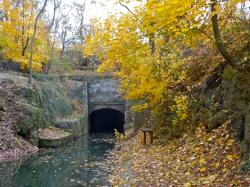
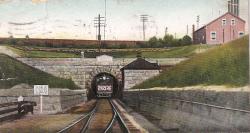
A Day's Pay According to tunnel records, the following pay rates were established for the 600-700 laborers required for this project:
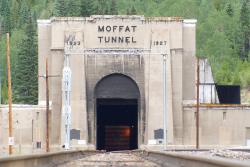
Known as "the highest and lowest holing in history," the tunnel bored through the Rockies at an elevation of 9,200 feet, 2,800 feet below the surface. Eight hundred men worked around the clock for 3 1/2 years, moving 3 billion pounds of rock.
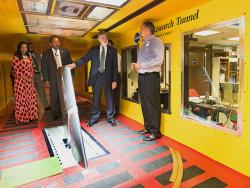
In operation since 1944, the Icing Research Tunnel is the oldest and largest refrigerated icing wind tunnel in the world. Technology developed there enables aircraft to fly safely through icing clouds. Two firsts include the unique heat exchanger and the spray system that simulates a natural icing cloud of tiny droplets.
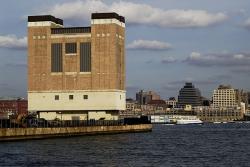
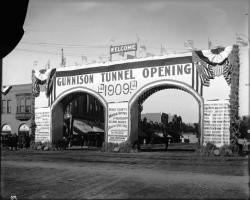
At its completion, the 5.8-mile Gunnison Tunnel under western Colorado's Vernal Mesa was the longest irrigation tunnel in America. It carried water from the Gunnison River to the Uncompahgre Valley to irrigate 146,000 acres of cropland.
Work on the 30,582-foot tunnel was first performed manually. Adverse geological conditions provided great challenge for this pioneering project. The drilling crews had to deal with clay, sand, shale, and a badly fractured fault zone.
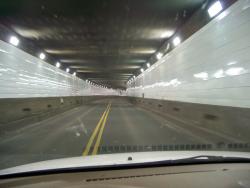
The Detroit-Windsor Tunnel is a 5,160-foot structure that carries traffic under the Detroit River between Detroit, Michigan and Ontario, Canada. Privately financed, built, and owned, it was completed in 26 months, 10 months ahead of schedule.
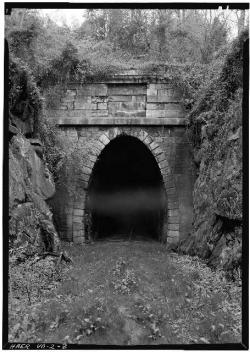
One of four single-track tunnels built by the Blue Ridge Railroad, the 4,273-foot Crozet Tunnel was constructed at a time when hand drills, pickaxes, and black powder amounted to state-of-the-art tunneling technology. At the time of its completion, it was the longest railroad tunnel in the world. Envisioned and built by Claudius Crozet, a French-born educator and civil engineer, the tunnel remains a testament to his belief in advancing rail transportation even when faced with numerous difficulties.
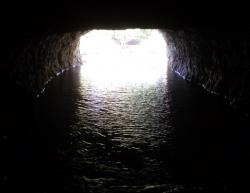
Montogomery Bell was a land developer and iron maker who purchased the Harpeth Narrows site to expand his industrial empire - which ultimately consisted of 14 iron blast furnaces throughout middle Tennessee.
The Harpeth River makes a tight bend around a steep limestone ridge, losing 17 feet of elevation in a run of 5 1/2 miles. Bell excavated a tunnel through the limestone ridge, creating a shortcut for the river. The hydropower derived from this drop in elevation was used to drive the Patterson Iron Works built by Bell.
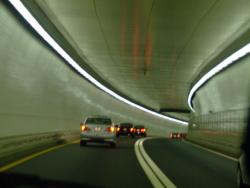
The 1.6-mile Holland Tunnel was the first underwater vehicular crossing of the Hudson River and the first tunnel specifically designed for automobiles and trucks. It dramatically reduced the time required to traverse the Hudson River, a trip previously possible only by ferry.
A major difficulty when tunneling beneath a river is to keep water and mud from inundating the workers and equipment in the tunnel. Builders of the Holland Tunnel used a shield that enveloped the work site as the excavation progressed; this also avoided obstruction of shipping traffic during construction.
Innovations
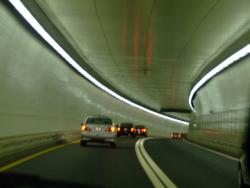
The 1.6-mile Holland Tunnel was the first underwater vehicular crossing of the Hudson River and the first tunnel specifically designed for automobiles and trucks. It dramatically reduced the time required to traverse the Hudson River, a trip previously possible only by ferry.
A major…
Read More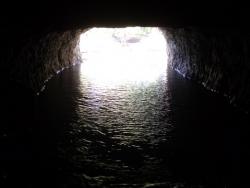
Montogomery Bell was a land developer and iron maker who purchased the Harpeth Narrows site to expand his industrial empire - which ultimately consisted of 14 iron blast furnaces throughout middle Tennessee.
The Harpeth River makes a tight bend around a steep limestone ridge, losing 17…
Read More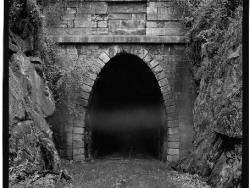
One of four single-track tunnels built by the Blue Ridge Railroad, the 4,273-foot Crozet Tunnel was constructed at a time when hand drills, pickaxes, and black powder amounted to state-of-the-art tunneling technology. At the time of its completion, it was the longest railroad tunnel in…
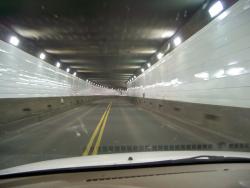
The Detroit-Windsor Tunnel is a 5,160-foot structure that carries traffic under the Detroit River between Detroit, Michigan and Ontario, Canada. Privately financed, built, and owned, it was completed in 26 months, 10 months ahead of schedule.
The project's engineer, the firm of…
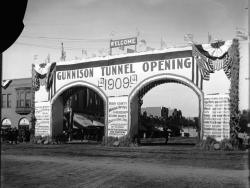
At its completion, the 5.8-mile Gunnison Tunnel under western Colorado's Vernal Mesa was the longest irrigation tunnel in America. It carried water from the Gunnison River to the Uncompahgre Valley to irrigate 146,000 acres of cropland.
Work on the 30,582-foot tunnel was first performed…
Read More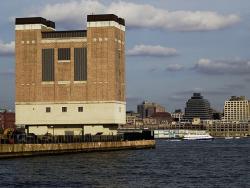
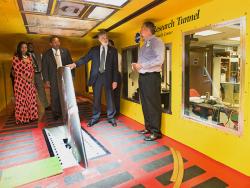
In operation since 1944, the Icing Research Tunnel is the oldest and largest refrigerated icing wind tunnel in the world. Technology developed there enables aircraft to fly safely through icing clouds. Two firsts include the unique heat exchanger and the spray system that simulates a natural…
Read More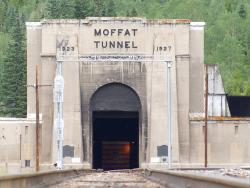
Known as "the highest and lowest holing in history," the tunnel bored through the Rockies at an elevation of 9,200 feet, 2,800 feet below the surface. Eight hundred men worked around the clock for 3 1/2 years, moving 3 billion pounds of rock.
Three thousand feet under the Continental…
Read More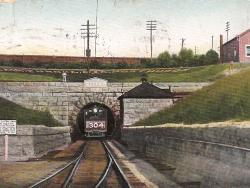
A Day's Pay According to tunnel records, the following pay rates were established for the 600-700 laborers required for this project:
- 17.5 cents per hour for diggers
- 15 cents per hour for erectors
- 12.5 cents per hour for others
- One additional…
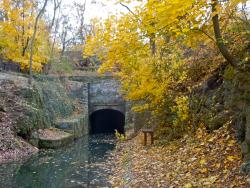
According to oral history, George Washington visited the canal diggings in 1792, and then again in 1794, while he was accompanying troops to suppress the Whiskey Rebellion in Western Pennsylvania.
The Union Canal Tunnel was a crucial structure allowing the connection of the eastern and…
Read More

